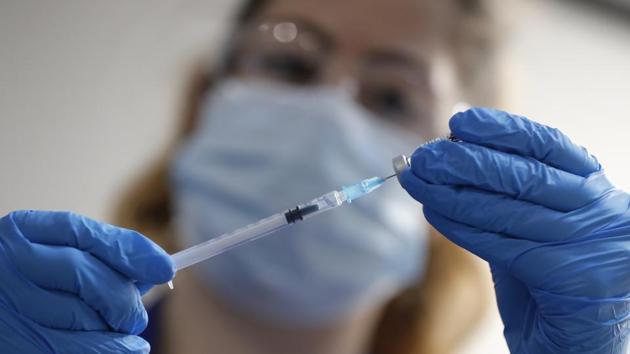UK looking at allergic reaction to Pfizer-BioNTech vaccine
“We’re looking at two case reports of allergic reactions,’’said Dr June Raine, head of the UK’s medical regulatory agency as she testified on Wednesday to a Parliamentary committee. “We know from the very extensive clinical trials that this wasn’t a feature.”
People with a history of allergic reaction should not have the Pfizer-BioNTech vaccine, British health officials said on Wednesday, after two individuals who received it on Tuesday showed strong adverse reaction.

“We’re looking at two case reports of allergic reactions,’’said Dr June Raine, head of the UK’s medical regulatory agency as she testified on Wednesday to a Parliamentary committee. “We know from the very extensive clinical trials that this wasn’t a feature.”
Raine, chief executive of the Medicines and Healthcare products Regulatory Agency (MHRA) said the new advice is that people with a significant history of allergy to vaccines and drugs should not have the vaccine.
Stephen Powis, England’s medical director, said: “As is common with new vaccines the MHRA have advised on a precautionary basis that people with a significant history of allergic reactions do not receive this vaccination after two people with a history of significant allergic reactions responded adversely yesterday. Both are recovering well”.
Thousands of people were vaccinated with the vaccine across the UK on Tuesday, with more attending clinics and hospitals on Wednesday. The initial supply of 800,000 doses is to be followed by 4 million more from Belgium before the end of the month.
Raine said: “Even last evening we were looking at two case reports of allergic reactions. We know from the very extensive clinical trials that this wasn’t a feature, that if we need to strengthen our advice now that we’ve had this experience in the vulnerable populations - the groups have been selected as a priority - we get that advice to the field immediately”.
She said it was possible to approve the vaccine expeditiously because the MHRA adopted a “novel or innovative” regulatory process, known as the rolling review of data from trials.
“Normally, all the data on a vaccine’s safety, quality and effectiveness, and all required documentation, must be submitted together to start an evaluation to approve a medicine or a vaccine”.
“But in this case, in the case of a rolling review, we reviewed data in packages or tranches as soon as they became available from the ongoing studies, on a staggered basis. By reviewing data as soon as it became available, we could reach an opinion sooner on whether the medicine or the vaccine could be approved.”
Raine added that the flexibility and the agility of the clinicians and scientists at the MHRA, coupled with their familiarity with vaccine development and approval, and the access to independent expert advice was key to its ability to progress in the shortest time.






